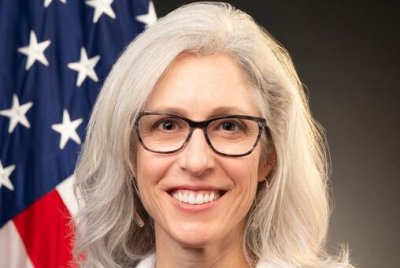Aug. 27 (UPI) — The director of the Centers for Disease Control and Prevention left after less than one month on the job, and four top officials with the agencies resigned.
Susan Monarez, 50, the first non-physician to lead the agency in more than 50 years, was confirmed by the U.S. Senate on July 29 in a 51-47 vote and sworn in on July 31. She served as acting director when Donald Trump became president again on Jan. 20 and was nominated for the top job on March 24. Dave Weldon‘s nomination was withdrawn because of the former U.S. House member’s questioning of vaccine safety.
For two years, she was deputy director of the Advanced Research Projects Agency for Health, where she applied artificial intelligence and machine learning to health matters.
“Susan Monarez is no longer director of the Centers for Disease Control and Prevention,” a post on the Department of Health and Human Services’ X account said. “We thank her for her dedicated service to the American people.”
The post also said Health and Human Services Secretary Robert F. Kennedy has “full confidence in his team at @CDCgov who will continue to be vigilant in protecting Americans against infectious diseases at home and abroad.”
NBC reported four other top CDC officials submitted their resignations: Dr. Debra Houry, the CDC’s chief medical officer; Dr. Demetre Daskalakis, director of the National Center for Immunization and Respiratory Diseases; Dr. Daniel Jernigan, the director of the National Center for Emerging and Zoonotic Infectious Diseases; and Dr. Jen Layden, director of the Office of Public Health Data, Surveillance and Technology.
The CDC, which is part of HHS, had 12,820 employees in September 2024, but the numbers have thinned, including 600 terminated earlier this month. In March, HHS announced plans to cut 2,400 positions.
Monarez received three degrees at the University of Wisconsin: Bachelor of Science, Master of Science and a doctorate.
Just eight days after being sworn in, Monarez was thrust into a tragic situation.
On Aug. 8, a gunman shot at six buildings of the CDC’s headquarters in Atlanta, and one police officer died. The gunman, who died at the scene, had said the COVID-19 vaccine made him sick and blamed the CDC,
Members of the CDC union want lies about the COVID-19 shot’s safety to be strongly debunked.
“We know that misinformation can be dangerous,” Monarez said during a meeting, according to a transcript obtained by NBC News. “Not only to health, but to those that trust us and those we want to trust. We need to rebuild the trust together.”
She was supposed to convene a meeting with CDC staff on Monday about safety concerns and security enhancements.
“Unfortunately, we need to postpone Monday’s event for an HHS meeting that I have been asked to attend in person in DC,” Monarez wrote in an email to CDC staff seen by NBC News.
Sources told The New York Times that Monarez objected to Kennedy replacing all members of the CDC advisory committee on vaccines. He distanced the entire committee of all 17 members, and on June 11 named eight people, including prominent vaccine skeptics and pandemic response critics.
The Advisory Committee on Immunization Practices normally includes pediatricians, geriatricians and other vaccine experts but the new panel includes a psychiatrist, neuroscientist, epidemiologist and biostatistician, and professor of operations management.
The CDC recommends the updated 2024-2025 COVID-19 vaccine for everyone 6 months and older based on age, vaccination history and immune status. Patients and their families are urged to consult with their physician.
Earlier Wednesday, the Food and Drug Administration approved the latest round of COVID-19 vaccines, but new limits were set on which Americans can get them. The agency ended its authorization for the broad use of COVID-19 shots, clearing them only for patients at higher risk of severe illness, and those age 65 and older — or younger adults with at least one underlying health condition who would qualify.
Last week, HHS confirmed Retsef Levia, a vocal COVID-19 vaccine opponent, was appointed to lead a CDC subcommittee reviewing safety of the shots.
On Aug. 5, Kennedy announced HHS will terminate 22 contracts worth $500 million to develop vaccines for respiratory viruses using mRNA technology, including COVID-19 shots, after officials determined the “technology poses more risks than benefits for these respiratory viruses.”
